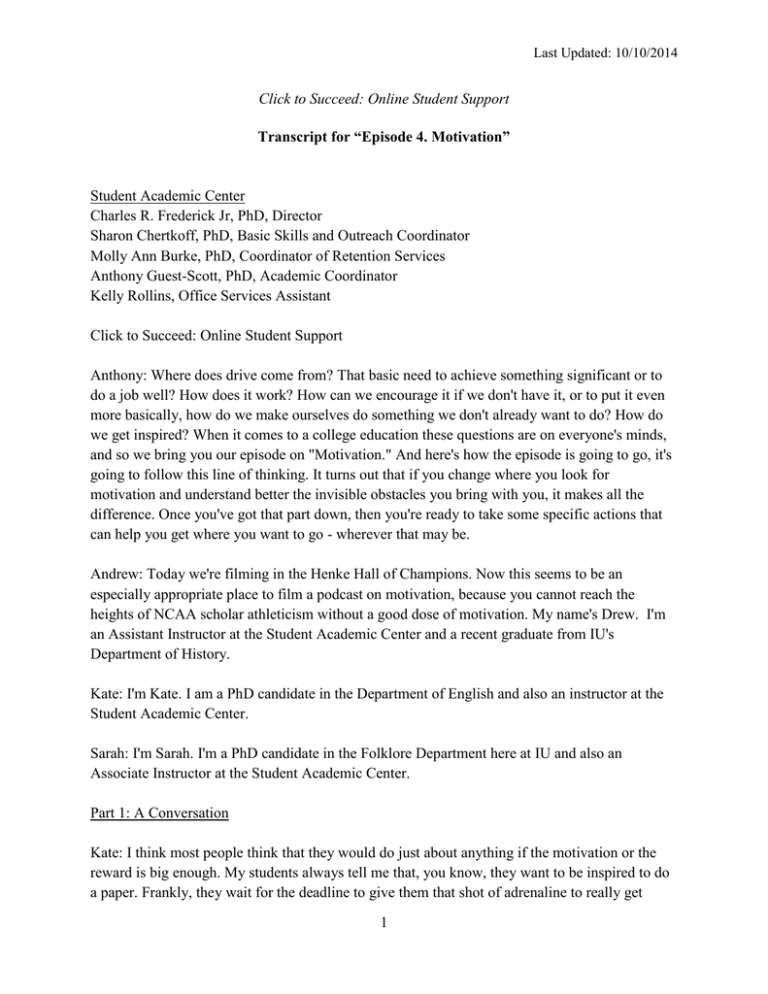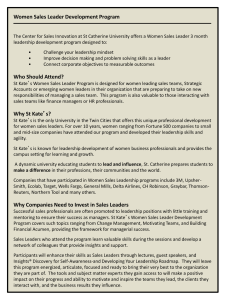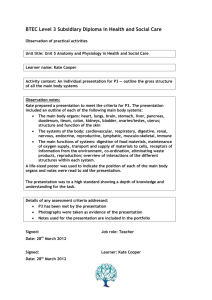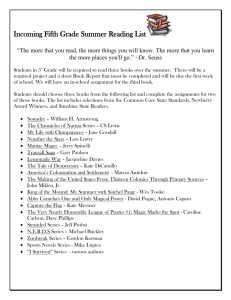
Last Updated: 10/10/2014
Click to Succeed: Online Student Support
Transcript for “Episode 4. Motivation”
Student Academic Center
Charles R. Frederick Jr, PhD, Director
Sharon Chertkoff, PhD, Basic Skills and Outreach Coordinator
Molly Ann Burke, PhD, Coordinator of Retention Services
Anthony Guest-Scott, PhD, Academic Coordinator
Kelly Rollins, Office Services Assistant
Click to Succeed: Online Student Support
Anthony: Where does drive come from? That basic need to achieve something significant or to
do a job well? How does it work? How can we encourage it if we don't have it, or to put it even
more basically, how do we make ourselves do something we don't already want to do? How do
we get inspired? When it comes to a college education these questions are on everyone's minds,
and so we bring you our episode on "Motivation." And here's how the episode is going to go, it's
going to follow this line of thinking. It turns out that if you change where you look for
motivation and understand better the invisible obstacles you bring with you, it makes all the
difference. Once you've got that part down, then you're ready to take some specific actions that
can help you get where you want to go - wherever that may be.
Andrew: Today we're filming in the Henke Hall of Champions. Now this seems to be an
especially appropriate place to film a podcast on motivation, because you cannot reach the
heights of NCAA scholar athleticism without a good dose of motivation. My name's Drew. I'm
an Assistant Instructor at the Student Academic Center and a recent graduate from IU's
Department of History.
Kate: I'm Kate. I am a PhD candidate in the Department of English and also an instructor at the
Student Academic Center.
Sarah: I'm Sarah. I'm a PhD candidate in the Folklore Department here at IU and also an
Associate Instructor at the Student Academic Center.
Part 1: A Conversation
Kate: I think most people think that they would do just about anything if the motivation or the
reward is big enough. My students always tell me that, you know, they want to be inspired to do
a paper. Frankly, they wait for the deadline to give them that shot of adrenaline to really get
1
Last Updated: 10/10/2014
going, right? But motivation actually doesn't work that way. Motivation really doesn't work well
when it's all based on "What am I going to get out of this" or "When does it have to be done?"
Andrew: Yeah. and sometimes they make the mistake of thinking "I can't work at all until I'm
inspired." What they don't realize is that the work can be the inspiration.
Kate: And I think big punishments, right, big sticks also aren't as motivating as we think they
are. I always used that as an undergrad. The deadline was my time management, right? I
prioritized based on when things are due. Three or two days before the paper, start to freak out
and then really start writing it, and I know it's done when it's due. Right? But, that actually is
nowhere near the best work I could have done, and it really doesn't matter what my grades were,
whether they were high or low. I was not doing even good work now when I look back on it.
Sarah: See, not only does that not create good work, but that it's just a miserable process, right,
because what you're living with day in and day out as you're trying to meet these deadlines is just
the fear of these deadlines. And you're so stressed out about getting everything done that you're
not taking advantage of the opportunity to really learn something new and maybe develop a new
interest along the way.
Andrew: You know, sometimes my students say, "I do my best work the night before." And I
always say "No, you do work the night before. But it isn't your best."
Kate: And if you've never actually worked earlier than the night before, you have no idea what
your best work is. You could be just smothering your potential and your ability.
Part 2: Where You Look for It
Andrew: Okay, so now let's try to figure out what we know about motivation and where it comes
from. I'm intrigued about your props there, Kate. It looks like you've got a candle problem.
Kate: Right, absolutely. This, "the candle problem," is really an experiment that was conducted.
People walked into a room. And in the room there was a table, like this. There was a candle, a
box of thumbtacks - which I'm dumping onto the table, right, like I would in the real room - and
a bunch of matches. And the whole problem that people had to accomplish, their goal, was to get
this candle attached to the wall so it does not drip on the table. Right? And, so, initially people
would take a couple of moves, right, and they would try a way to, like, thumbtack the candle to
the wall, and prop it up on the thumbtacks, and then they would have the bright idea to use a
match and melt the side of the candle and try and stick it to the wall. But, after about five or ten
minutes, everyone overcame their functional fixedness and they figured out the solution to the
problem.
2
Last Updated: 10/10/2014
Andrew: Well now, wait a minute, you said "functional fixedness." What's that?
Kate: "Functional fixedness" is when you think of something in terms of only one job it can do.
There's only way to do something, there's only one way something can function. So in this case,
it was that people thought the box of thumbtacks was just there to hold the thumbtacks, right?
But when they figured out that they could dump the thumbtacks out, put the candle in the box,
and then tack the box to the wall, right? Now we've got a holder for the candle so it's attached to
the wall and the box will catch all of the wax so it doesn't drip.
Sarah: Right, that's a great experiment and everything, but what does it have to do with
motivation?
Kate: Well, let's let Daniel Pink, the author of the book Drive, explain to us exactly how this sort
of experiment can be used to understand motivation.
Daniel: This shows the power of incentives. Here's what he did. He gathered his participants and
he said, "I'm going to time you, how quickly you can solve this problem." To one group, he said
"I'm going to time you to establish norms, averages, for how long it typically takes someone to
solve this sort of problem. To the second group, he offered rewards. He said, "If you're in the top
25 percent of the fastest times, you get five dollars. If you're the fastest of everyone we're testing
here today, you get twenty dollars." OK? Now this is several years ago. Adjusted for inflation,
it's a decent sum of money for a few minutes of work, OK? It's a nice motivator. Question: How
much faster did this group solve the problem? Answer: It took them, on average, three and a half
minutes longer. Three and a half minutes longer. Now this makes no sense, right? I mean, I'm an
American, I believe in free markets. That's not how it's supposed to work, right? If you want
people to perform better, you reward them, right? Bonuses, commissions, their own reality show.
Incentivize them. That's how business works, but that's not happening here. You've got an
incentive designed to sharpen thinking and accelerate creativity, and it does just the opposite. It
dulls thinking and blocks creativity. And what's interesting about this experiment is that it's not
an aberration. This has been replicated over and over and over again for nearly forty years. These
contingent motivators, "If you do this, then you get that" work in some circumstances, but, for a
lot of tasks, they actually either don't work or often they do harm. This is one of the most robust
findings in social science and also one of the most ignored.
Kate: Okay, so we can see from that clip that, actually, with larger rewards performance goes
down.
Sarah: The result is that there is a huge difference between what science understands about
motivation and what business thinks about motivation.
3
Last Updated: 10/10/2014
Andrew: We're using 20th century business practices that don't quite translate in our 21st century
world.
Kate: That's right. Pink says we need an entirely new approach to understanding motivation, one
that's actually built on science and not just on, kind of, common sense assumptions, right? And
the building blocks for these new systems of motivation are…
Andrew: Well, one of them would be "autonomy," the desire to direct our own lives.
Sarah: Right, one is "mastery," the desire to just get better at something.
Kate: And the third is purpose, the desire to work for something larger than our self.
Andrew: So what we're really talking about here is the difference between intrinsic motivation
and extrinsic motivation. So extrinsic motivation, for example… Well, first off, let me define it.
It's the idea that what motivates you comes from outside of you. Someone or something else is
providing you the reward. An example of this might be like when I was in elementary school, my
parents said, "You need to learn how to play guitar." Because my mom had played guitar and my
grandparents had played guitar, and they thought I should, too. But I wasn't particularly keen on
that idea, so you can imagine how my weekly practices went, how my dedication to the
instrument was, and you can also imagine, probably, the conflict between my parents and I. The
extrinsic motivation simply wasn't enough for me to pick up that instrument.
Sarah: Right, and that's actually not all that different from being totally motivated in school by
the desire to get a particular grade, or by the desire to finish a particular task without worrying
about the process or the quality of the product that you produce at the end. If the only thing that
motivates you in your school work is the desire to get a B or an A in the class, then you're not
going to really embrace the opportunities that that educational process is offering you.
Kate: Absolutely.
Kate: Let's talk about what does work, right? Intrinsic motivation is what actually works so that
people do their best work, get enthusiastic about the work they're doing, and perform to a really
high degree.
Andrew: Now what we mean by intrinsic motivation is the idea that what motivates you actually
comes from inside you. You want it. Not because of some external reward, but because of
something that satisfies you. So, an example of this that I'm thinking of, if I relate it back to my
youth again, whenever I was a young person my parents asked me if I would like to play some
kind of sport. And there were several sports to choose from, and I chose hockey because an
4
Last Updated: 10/10/2014
uncle had taken me to an ice hockey match. And I was only 5 years old. And it's very hard for a
five-year-old to learn how to ice skate. But nevertheless, I loved this sport, and so I went to
practices enthused, and I played my heart out, and I got better at ice hockey. And it wasn't
because of any external award. It was only because I wanted to do it for me.
Kate: And since we're in the Hall of Champions, that's the thing we have to remember. That
excellence in sports, excellence in athletics, right, that doesn't come because someone has praised
you. That doesn't come because you want to feel like, you know, maybe one day I can make
money. That comes from a real sense of purpose and drive. If you're not bringing one hundred
percent to the practice, to working on skills, to being competitive, to showing up mentally in the
games, you're not going to achieve anything. And the same is really true in any other of the
things we might want to try and do with our lives.
Kate: So to sum up, right, we have to stop thinking about all those external rewards as the only
reason we're doing anything. And the second we move away from thinking, right, what's the
external reward, what's the extrinsic motivator, and instead we look inside ourselves for
motivation, that's what puts us on an entirely different path. That's when we start asking different
kinds of questions, and that's where we can actually tap into our own excellence.
Andrew: Now let's illustrate this. What we'll do is head down to one of the classrooms, and we'll
have Anthony be one of our professors. We'll pretend it's the first day of class and that we're
taking a look at the syllabus for the semester. Now, the three of us are going to play different
kinds of intrinsic and extrinsic motivated students. You see if any of the things that we're
thinking, you've thought before, too.
Professor: Okay, so, you guys, you know we have this paper coming up. It's one of the biggest
projects in the class, and it's about ten pages long. And in this paper what I want you to do is to
take George Ritzer's theory of "McDonaldization," which is an updating of Weber's
"rationalization" theory, and I want you to think through your own model of consumption…
Andrew: (thinking) Ten pages! Oh my gosh! I wonder if he will accept nine and a half. Does he
round up? Huh. How many sources? He didn't say how many sources; I wonder what the
minimum number of sources is, and how does he want those cited? Also, I think the easiest way
to do this would be to think of the theory I want to use first, and then think of some evidence to
fit it, rather than to do it the other way. I could probably produce a pretty good paper here. Shoot,
he might even show the whole class as an example of good writing. Well, let's see, maybe two
nights to get this done? Yeah, maybe three. All right.
Kate: (thinking) Ugh, I hate papers! Why does this have to be so long? Can I do, like, the
"Arby's-ization" of America or the "Chipoltle-ization" of America? Is that different enough from
5
Last Updated: 10/10/2014
what he did? Uhhh, god. I wonder if I did anything in another class I could use for this. What do
I have to do to get an A or a B? What does he want? Man…
Sarah: (thinking) Okay, McDonaldization. This book has been pretty interesting. New theories
for the McDonaldization book… You know, I was at the zoo last week - a couple of my friends
really wanted to go to the zoo, and I was thinking a lot about how some people, it seems, in
society are kind of like the animals in the zoo, and some people are like the people who walk
through and pay money to look at the animals in the zoo. In a lot of ways there's a lot about the
zoo that kind of models the way the world really works. Maybe I can write my paper on that.
Those four theories, right, those four theories in the book… I never really… I need to meet with
the instructor to make sure that I understand what's going on with those. But I really think I could
be on to something with this whole zoo issue. Research… okay. I should talk to the professor,
maybe talk to a librarian, to see if they can point me in the right direction of some sources that
might be relevant for this. I think this could be really interesting.
Anthony: Okay, I'm going to break back into the episode for a couple minutes here to talk a little
more about what we were trying to illustrate in that classroom scene. So Ken Bain wrote a book
called What the Best College Students Do. And in that book he talks about two kinds of learners:
"surface learners" and "deep learners." "Surface learners" are extrinsically motivated and deep
learners are "intrinsically motivated." So Drew was illustrating one kind of extrinsically
motivated surface learner - the "Strategic Learner." The Strategic Learner cares most about
getting great grades. What does the professor want me to do? How do I ace the next exam? And
they see college as a kind of checklist to complete and a chance to really shine in front of others.
Kate was illustrating another kind of extrinsically motivated surface learner. And that is the
"Work Avoider" or the "Performance Avoider." This student is motivated primarily by a fear of
failure. They feel most successful when the work is easy or when they can get out of it. And they
see college as something, basically, to survive. Finally, Sarah was illustrating an intrinsically
motivated "Deep Learner." This kind of learner cares about great grades, too, but they're most
motivated by understanding the meaning behind what they're learning. They respond to the
challenge of mastering something. And they're motived by the love of learning itself. The best
college students are these Deep Learners. With that said, there are some real obstacles to
becoming this kind of Deep Learner that students face. And I'm going to turn it back over to
Drew, Kate, and Sarah to talk to you a little bit more about that.
Part 3: Invisible Obstacles
Sarah: Okay, so, a huge component of learning how to be a Deep Learner involves mastering the
art of overcoming "invisible obstacles." What I mean by "invisible obstacles" are the things that
are lurking in the background, trying really hard to get in your way. These might be things you're
6
Last Updated: 10/10/2014
not even aware of that are affecting what kind of learner you are at this point. And they're not
choices you've made, but rather, are the products of the society that we're all living in.
Kate: Absolutely. If you're a college student right now, there are a lot of pressures and forces that
are going to encourage you to just take this very strategic, surface approach to your education.
This extrinsic approach is really affected by the cost of higher education. The cost is rising all the
time and financial support for students is declining, and that leaves a lot of students to face really
substantial debt to pay after their education is over. That pressure, in turn, forces students to try
and, first of all, finish school as quickly as they possibly can, and it leads them to emphasize
making money and vocational interests over every other goal they might have. After all, that
kind of deep learning that we're talking about, that really takes a lot of time. And time is not a
luxury that many people feel they can afford right now.
Sarah: A lot of students also arrive from high schools where they were taught to the test,
privileging rote memorization strategies over real understanding in the classroom. And that's
really strategic "Surface Learning." Your perception of what real learning means when you start
college might be the real primary wall standing in your way forward of becoming a "Deep
Learner."
Andrew: And there's a growing sense that college is the new high school. I think many students
are here because they feel they have to be for even marginally gainful employment. As we've
already seen, feeling forced into doing something is a motivation killer.
Sarah: So, what do we do about it? So let's take a look now at some actions you can take to begin
to gain intrinsic motivation, become a deep learner, and overcome some of these invisible
obstacles.
Part 4: Actions
Andrew: So now let's return to Daniel Pink's three main concepts. I'll talk about autonomy. The
wonderful thing about coming to a university like Indiana is that while you have to be in some
kind of major and within some kind of department, nevertheless, there's a great deal - a huge
range - of classes that you can take and also professors that you can take classes from. Now this
is fantastic because there are a lot of different paths to accomplish whatever it is that you're
wanting to major in, and students need to take advantage of this. They need to exert their own
autonomy and select classes that are going to be interesting to them. Now in my own case, this
especially played out. I was in the history department and I could have, of course, focused on
Russian history, or European, or Asian, or African, American; whatever I wanted. But what I
actually wanted was a combination of early colonial history, but with a global kind of reach. And
so I asked the department, could I create my own major that would include those kinds of classes
7
Last Updated: 10/10/2014
and they said absolutely. And what I found was that by following that kind of interest, my
interest, and using my autonomy to create my own kind of path, I found that I was a much better
student taking classes that I really liked from professors that I enjoyed and ended up having a
wonderful time with my degree.
Kate: Okay, well the other thing to keep in mind that we really need to take from Daniel Pink's
lecture is this idea of mastery. Mastery is not about setting goals that are about the external
world. It's not about grades. It's not about graduation. Those are wonderful things to be aware of,
but the real goals they need to set are knowledge goals. What do I need to get out of this class,
right, every day? What do I need to build in my skill set this semester and have I done it? Real
mastery is really about kind of climbing a mountain, and so there are no shortcuts. You can't skip
over something because, first of all, you never know when you need it later. By the time you
figure out what you need, whether it's the ability to think in a complex way, in a creative way,
the ability to problem-solve in ways you never thought, you've already missed it, right? If you're
three years into your job and you realize you need really complex creative thinking, and you've
always skipped the opportunity to learn how to do that, you're going to be stalled out in your
career, you're not going to get promoted. The last thing to really know about mastery is that you
have to be able to not only motivate yourself for excellence but you have to bounce back.
Everybody has setbacks. Everybody has bad tests. Everybody has a bad class, a rough semester,
but instead of blaming the external world or even just saying, "There's something's wrong with
me, I'm bad at math, I'm bad at science, I've never been good at English," you have to bounce
back. You have to take that as constructive criticism and feedback so that you can pick yourself
up, take the information, and run with it and go somewhere better.
Sarah: So the third point from Daniel Pink's lecture is this idea of purpose. Figuring out what
your purpose is is really about asking big questions, right? Why am I in college? What do I want
to get out of this time that I'm spending here besides just a degree? What is it that motivates me
to really make a difference in my life and in the lives of others? For my own case, I happened to
take a class once, a long time ago, that was about narrative and storytelling and the way all of us,
all people, construct their lives based on an understanding of story and the stories that they've
heard or how a story's supposed to go. This idea fascinated me. I latched onto it. I took a couple
years off, I traveled a lot, I saw it everywhere I went, and ended up coming back here to do a
Ph.D. in folklore which has been really incredibly rewarding for me. And I think that that's
because I happened to find something. It took me a while. I was a very extrinsically motivated
student for much of my college career! But when I finally found that sense of purpose it
completely changed everything, and I came to love my education a lot more than I had ever done
before.
Andrew: And you were probably a lot better student.
8
Last Updated: 10/10/2014
Sarah: Absolutely, absolutely.
Andrew: So that's the thing about deep learning. It is hard work and it takes a lot of time, but it is
such a worthy goal to have. It will not only help you with your grades and help you get the
knowledge, but it will also make the classroom a lot easier and it'll help you to enjoy your
education. But the other big payoff is that that is a lifelong skill. For the rest of your life, you'll
be a curious adult, an inquisitive adult, and a learning adult, and that is one of the best things
about life. So now, Anthony, let's go to the take-aways.
The Take-Aways
Anthony: Okay, so for the take-aways, I'm going to go back to the questions I asked at the
beginning of the episode. How does motivation work? The answer? To achieve the ultimate
degree of drive and motivation, it must come from inside of you, not from external rewards and
punishments. How can we encourage motivation if we don't have it, or how do we get inspired?
The answer? We don't wait for it to happen. We create it ourselves. If the ultimate motivation
comes from inside of you, it has to work this way. And then finally, what does this look like
when it comes to a college education? You become a deep learner. Not one primarily motivated
by grades or by fear of failure. Well, "How do you do that?" you might ask. I'm going to go back
to "autonomy," "mastery," and "purpose" for this one. Autonomy: You study what interests you.
You pick a major that you love, that you would do even if a degree was not attached. You pick
classes and professors because they're the best, not because they're the easiest or because they fit
your schedule. Mastery: You dedicate yourself to becoming an expert on some subject. And
purpose: You connect your education to some higher goal. You make it matter. Until next time.
Co-Hosts
Andrew M. Koke
Kate Goldstein
Sarah Gordon
Boom Operator
Amber Girven
Scripts, Videography, Editing, and Original Music
Anthony Guest-Scott
Additional Film, Video, and Images
StockFootageForFree.com
StockPhotosforFree.com
9
Last Updated: 10/10/2014
"The Puzzle of Motivation" Courtesy of Daniel Pink, presenter and TED Talks (Recorded July
2009) http://www.ted.com
Produced By
The Student Academic Center, Office of the Vice Provost for Undergraduate Education
© Copyright 2013 The Trustees of Indiana University. All Rights Reserved.
The Student Academic Center
Great Teachers. Small Classes. Real Help.
10



![The mysterious Benedict society[1]](http://s2.studylib.net/store/data/005310565_1-e9948b5ddd1c202ee3a03036ea446d49-300x300.png)



